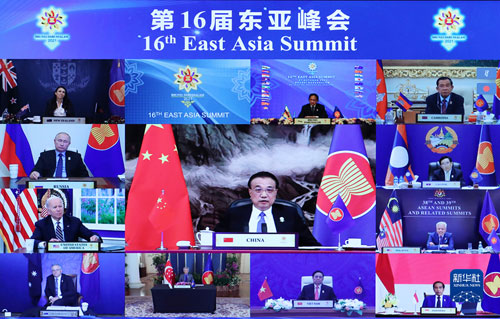
On the evening of October 27, 2021, Premier Li Keqiang attended the 16th East Asia Summit (EAS) at the Great Hall of the People. Leaders of ASEAN countries, as well as Russian President Vladimir Putin, ROK President Moon Jae-in, U.S. President Joseph R. Biden, Japanese Prime Minister Fumio Kishida, Indian Prime Minister Narendra Modi, Australian Prime Minister Scott Morrison, and New Zealand's Prime Minister Jacinda Ardern attended the meeting. Sultan Haji Hassanal Bolkiah of Brunei presided over the meeting, which was held via video link.
Li Keqiang said that as a "leaders-led strategic forum", the EAS has a membership covering major countries in the Asia Pacific and enjoys broad-based representation and influence. Not long ago, President Xi Jinping put forth the Global Development Initiative. As an important engine driving global growth, East Asia must pursue parallel progress in fighting the pandemic and recovering the economy, and inject continued impetus into global development.
Li Keqiang pointed out that the EAS should remain committed to its defined role, keep to the right direction of regional cooperation and pursue political and security cooperation and economic and social progress in a balanced way. Mutual respect for sovereignty and territorial integrity is a basic norm governing international relations and an important guiding principle of the EAS. It is important that we uphold the spirit of mutual respect and work together in unity to invest more in COVID response and economic recovery, safeguard regional peace and stability, and promote development and prosperity. To this end, China wishes to make the following proposals:
First, we need to join hands to fight COVID-19. China will do what it can to scale up assistance in vaccines and other anti-COVID supplies in light of the needs of relevant countries. The implementation of the China-ASEAN Cooperation Program on Public Health Management needs to be expedited to help enhance regional capacity on public health.
Second, we need to promote all-round economic recovery. We need to uphold free and fair trade, and ensure unimpeded international logistics. Efforts should be intensified to facilitate the early entry into force and implementation of the Regional Comprehensive Economic Partnership Agreement (RCEP). China has officially applied to join the Comprehensive and Progressive Agreement for Trans-Pacific Partnership (CPTPP) and will further raise the level of its opening-up commitments. China will support regional countries in boosting the recovery of the tourism industry.
Third, we need to promote green development. We need to follow the principle of common but differentiated responsibilities and fully and effectively implement the Paris Agreement. We need to pursue a low-carbon transition in a balanced and orderly manner, and realize coordinated advances in economic development and people's well-being while ensuring stability and security in the energy supply. China proposes that this meeting release a statement on sustainable recovery.
Fourth, we need to support ASEAN centrality. An ASEAN-centered, open and inclusive regional cooperation architecture is an important cornerstone for the region's long-term peace and prosperity. We need to support ASEAN Community building and its efforts in upholding multilateralism, and safeguard the UN-centered international system.
Li Keqiang said that Myanmar is an important participant in East Asian cooperation. China supports ASEAN in properly handling the relevant issues in the ASEAN Way to promote ASEAN unity, regional stability and Myanmar's peace and reconciliation process.
Li Keqiang stressed that the South China Sea is our common home. Maintaining peace, stability and the freedom of navigation and overflight in the South China Sea serves the common interests of all parties. Thanks to the joint efforts of China and ASEAN countries, the situation in the South China Sea has maintained overall stability. Having reached consensus on effective and substantive regional rules, China and ASEAN countries are implementing the Declaration on the Conduct of Parties in the South China Sea in a comprehensive and effective way. Despite the impact of COVID-19, the two sides have substantially resumed and actively pressed ahead with the "Code of Conduct in the South China Sea" consultations. The efforts of regional countries for peace and stability in the South China Sea should be respected. China is ready to work with all parties to enhance unity, broaden cooperation, promote common development, achieve prosperity and stability, and write a new chapter of East Asian cooperation.
The participating leaders said that since last year, the EAS member states have continuously promoted cooperation in health, economy and trade, energy, oceans, education, green development and other fields and achieved positive results. Global challenges such as the COVID-19 pandemic and climate change cannot be met alone. All parties should operate in the spirit of "We Care, We Prepare and We Prosper" to uphold multilateralism, promote the equitable distribution of vaccines and medicines, and strengthen cooperation on the digital economy, free trade, public health and climate change. All parties should also keep industrial and supply chains stable and smooth, and deepen regional economic integration. All parties should respect ASEAN centrality and the ASEAN-led regional cooperation framework and work together to promote peace and prosperity in the region and the world.
The meeting adopted outcome documents, including the EAS Leaders' Statement on Sustainable Recovery, the EAS Leaders' Statement on Mental Health Cooperation, and the EAS Leaders' Statement on Economic Growth through Tourism Recovery.
Xiao Jie attended the meeting.
